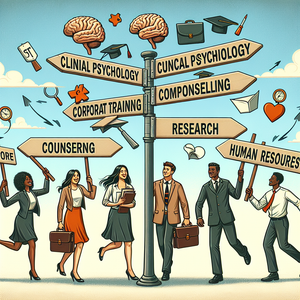Bridging Psychology and Technology: Emerging Careers for BA Graduates

As technology continues to permeate daily life, there is a mounting need for products and services that genuinely connect with users. Businesses are shifting their focus to user-centered design and experience, leading to a growing demand for professionals capable of merging human behavior with technological applications. Psychology graduates, armed with a profound understanding of cognitive processes, motivations, and social interactions, can provide essential insights into consumer behavior. This understanding is crucial for developing tech solutions that are not only functional but also resonate with users on a deeper level.
Emerging Roles for Psychology Graduates in Technology
One of the most promising career paths for psychology graduates is in behavioral analytics. Behavioral analytics specialists scrutinize user data to unveil patterns in behavior, empowering companies to customize their offerings to better align with user needs. For example, e-commerce platforms utilize behavioral analytics to dissect shopping habits, thereby crafting personalized marketing strategies that enhance customer engagement and drive sales. By interpreting data through a psychological lens, these professionals can help businesses optimize their operations and achieve greater success.
Digital Mental Health Professional
With the advent of teletherapy and mental health applications, psychology graduates are increasingly finding fulfilling roles in digital mental health. Their training allows them to contribute to the development and implementation of digital therapeutic solutions that are both evidence-based and user-friendly. Companies like Talkspace and Headspace leverage the expertise of psychology graduates to create impactful mental health resources that cater to various demographics. This intersection not only enhances the accessibility of mental health services but also ensures that users receive effective support.
User Experience (UX) Researcher
User experience researchers play a vital role in the product development cycle by conducting studies that illuminate how users interact with technology. Given their background in research methodologies and psychological principles, psychology graduates excel in this field. For instance, a UX researcher may carry out usability tests on a mobile application, identifying pain points and providing actionable insights that lead to design enhancements and improved user satisfaction. Their ability to empathize with users enables them to advocate for user needs during the development process.
Product Development Specialist
In the realm of product development, psychology graduates can significantly influence the creation of innovative products that address user needs. Their capacity to empathize with users and anticipate responses to various design elements allows them to contribute to the development of products that are not only functional but also emotionally engaging. Major companies, such as Apple and Google, actively seek individuals with a psychology background to help shape products that enhance user interaction and satisfaction, demonstrating the value of psychological insights in tech design.
Case Studies: Success Stories of Psychology Graduates in Tech
Several psychology graduates have made notable contributions to the tech industry, exemplifying the potential of this career trajectory. Dr. Jennifer Aaker, a psychology professor at Stanford University, has applied her research on emotions and social behavior to co-found a tech startup focused on enhancing social media interactions. Similarly, Dr. B.J. Fogg, a behavioral scientist at Stanford, established the Behavior Design Lab, where he develops technology solutions aimed at promoting positive behavioral changes in users. These individuals illustrate how psychology graduates can influence the tech landscape and drive meaningful change.
The convergence of psychology and technology presents exciting and unconventional career paths for BA psychology graduates. As the demand for behavioral insights within the tech industry continues to surge, psychology graduates are uniquely poised to contribute to various emerging roles, including behavioral analytics, digital mental health, user experience research, and product development. By leveraging their understanding of human behavior, these graduates can drive innovation, create impactful user experiences, and shape the future of technology. For psychology graduates eager to leave their mark in an ever-evolving landscape, the intersection of psychology and technology offers a realm of possibilities waiting to be explored.
Behavioral Data Scientist
E-commerce companies like Amazon, tech giants like Facebook, and analytics firms.
Core Responsibilities
Analyze user behavior data to identify trends and insights that inform product development and marketing strategies.
Collaborate with cross-functional teams to translate behavioral insights into actionable recommendations for improving user engagement.
Required Skills
Proficiency in statistical analysis tools (e.g., R, Python) and data visualization software (e.g., Tableau).
Strong understanding of psychological principles and their application to data interpretation.
Digital Therapeutics Designer
Companies such as SilverCloud Health, Woebot Health, and Headspace.
Core Responsibilities
Develop and assess digital therapy solutions that provide mental health support through apps and online platforms.
Work closely with clinical teams to ensure that therapeutic content is evidence-based and user-friendly.
Required Skills
Background in clinical psychology or counseling, along with experience in digital content creation.
Familiarity with UX/UI principles to enhance user engagement in therapeutic settings.
Human-Computer Interaction (HCI) Researcher
Technology firms like Google, Microsoft, and startups focusing on software development.
Core Responsibilities
Conduct qualitative and quantitative research to evaluate how users interact with technology and identify areas for improvement.
Design and implement experiments to test new interaction methods and gather user feedback for iterative design processes.
Required Skills
Strong research methodology skills and experience with usability testing.
Ability to synthesize research findings into clear, actionable insights for product teams.
User-Centered Design Consultant
Consulting firms, design agencies, and tech companies like IBM and IDEO.
Core Responsibilities
Advocate for user needs throughout the design and development process by conducting user interviews, surveys, and usability tests.
Provide strategic recommendations to enhance product usability and accessibility based on user feedback and psychological principles.
Required Skills
Expertise in user experience design principles and familiarity with design thinking methodologies.
Strong communication skills to present findings and influence stakeholders.
Cognitive Computing Specialist
AI-focused companies like IBM Watson, Google DeepMind, and various startups in the tech space.
Core Responsibilities
Work on the development of AI systems that mimic human thought processes and improve user interactions with technology.
Analyze user feedback and cognitive patterns to refine algorithms for better decision-making support.
Required Skills
Understanding of cognitive psychology and experience with machine learning frameworks.
Strong analytical skills and programming knowledge (e.g., Python, Java).


